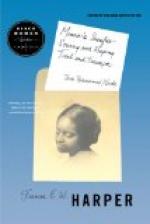Chapter V
By dint of energy and perseverance grandmother Harcourt had succeeded in getting everything in order when her guests began to arrive. She had just put the finishing touches upon her well-spread table and was reviewing it with an expression of pleasure and satisfaction. And now while the guests are quietly taking their seats let me introduce you to them.
Mr. Thomas came bringing with him the young minister, Rev. Mr. Lomax, whose sermon had so interested and edified Mrs. Harcourt the previous Sunday. Mrs. Lasette, looking bright and happy, came with her daughter, and Mrs. Larkins entered arrayed in her best attire, looking starched and prim, as if she had made it the great business of her life to take care of her dignity and to think about herself. Mrs. Larkins,[5] though for years a member of church, had not learned that it was unchristian to be narrow and selfish. She was strict in her attendance at church and gave freely to its support; but somehow with all her attention to the forms of religion, one missed its warm and vivifying influence from her life, and in the loving clasp of a helping hand, in the tender beam of a sympathizing glance, weary-hearted mothers and wives never came to her with their heartaches and confided to her their troubles. Little children either shrank from her or grew quiet in her presence. What was missing from her life was the magnetism of love. She had become so absorbed in herself that she forgot everybody else and thought more of her rights than her duties. The difference between Mrs. Lasette and Mrs. Larkins was this, that in passing through life one scattered sunshine and the other cast shadows over her path. Mrs. Lasette was a fine conversationalist. She regarded speech as one of heaven’s best gifts, and thought that conversation should be made one of the finest arts, and used to subserve the highest and best purposes of life, and always regretted when it was permitted to degenerate into gossip and backbiting. Harsh judgment she always tried to modify, often saying in doubtful cases, “Had we not better suspend our judgments? Truly we do not like people to think the worst of us and it is not fulfilling the law of love to think the worst of them. Do you not know that if we wish to dwell in his tabernacle we are not to entertain a reproach against our neighbor, nor to back-bite with our lips and I do not think there is a sin which more easily besets society than this.” “Speech,” she would say, “is a gift so replete with rich and joyous possibilities,” and she always tried to raise the tone of conversation at home and abroad. Of her it might be emphatically said, “She opened her mouth with wisdom and in her lips was the law of kindness.”




